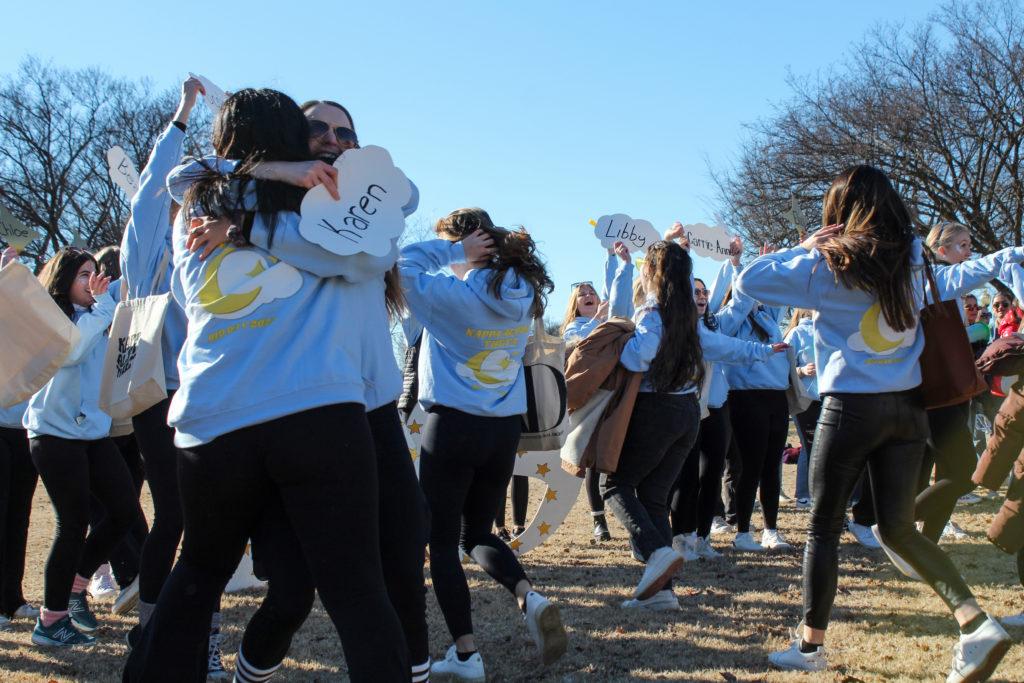Participation in formal sorority recruitment inched closer back to pre-pandemic levels earlier this month as students rushed in person for the first time since 2020.
A total of 311 students participated in this spring’s formal recruitment, a narrow reduction from the 340 who participated in 2020 – which, at the time, marked the lowest number of the previous 10 years. Officials transitioned the Panhellenic Association’s rush process online in 2021 and again last spring to avoid social gatherings that could worsen the campus spread of COVID.
Of the potential new members who participated in recruitment, 250 students accepted bids and joined a sorority chapter this spring, a 13 percent increase from the 222 student offers last school year. A total of 289 students accepted bids in 2020, nosediving in 2021 with 214 students joining a chapter.
Bryan Joyce, the director of fraternity and sorority life, said each of the 11 Panhel chapters gained between 19 to 28 new members during the spring recruitment process. Joyce declined to specify the exact number of members that each respective sorority recruited.
Joyce said students can still join a Panhel chapter during the informal open bidding process, which “some or all chapters” offer following the formal spring recruitment period, according to the Office of Student Life website.
Junior Evelynn Schoenthal, the president of Panhel, said most sorority members, other than some seniors, never experienced in-person recruitment because of the two-year hiatus. She said Panhel needed to adjust to the traditional in-person procedures like ordering T-shirts, printing name tags and providing meals for the recruitment events in the student center.
She said in-person recruitment connected current and potential new members during the rushing process in a way that was lacking from previous virtual years with more intimate in-person experiences, including Bid Day, when students head over from University Yard to their chapter waiting on the National Mall.
“Most members of Panhellenic at this point joined their chapter virtually, so being able to see our new members physically run home on Bid Day was really special,” Schoenthal said in an email. “The in-person experience bonded the Panhellenic community in a way we have not had the opportunity to in the past few years.”
Schoenthal said extensive marketing efforts from Panhel – which consisted of flyers, Instagram posts, tabling on the Mount Vernon Campus and in the University Student Center and a flea market where students could shop and learn more about Panhel chapters in October – likely contributed to the rise in participation from previous recruitment years. She said leading up to recruitment, each chapter attended workshops in the fall semester focused on educating members on the in-person recruitment process to foster a positive experience for everyone.
“The highlight of this recruitment season, apart from Bid Day, an exhilarating and exciting experience, was being in one place with members across the Panhellenic community,” Schoenthal said. “Recruitment put us all in one place, and I found it really fun saying ‘Hi’ and chatting with members I recognized from classes and other Panhellenic events in the hallways and bathrooms between rounds.”
Recruitment week consisted of four days of programming in the University Student Center – ranging from philanthropy day, where chapters discussed the sorority’s service projects, to preference round, after which PNMs make their final selection between two chapters. Students participating in recruitment met for up to several hours with sorority chapters over four days, according to a Panhel recruitment schedule obtained by The Hatchet.
Sophomore Noa Taussky, the membership chair of Kappa Kappa Gamma, said KKG posted Instagram takeovers where members filmed their daily routines and answered questions about recruitment and the chapter. She said KKG recruited 27 new members on Bid Day.
“I know last year, a lot of people that I knew that I was going to rush with didn’t end up doing it because it was online,” Taussky said. “So I think in person definitely made a lot more people want to.”
Taussky said participating in recruitment in person was more enjoyable and personable than previous years, sparking a growing interest in the process among underclassmen. She said chapters were able to get to know the potential new members better and increase their chances of connecting while they met in the same physical space.
“We really work together as a team,’’ Taussky said. “We didn’t see it as anything competitive. We just kind of saw it as ‘We are meeting new girls, and they’re cool.’ I think all of our mindsets were really positive going into it.”
Junior Mae McMillin, the president of Kappa Alpha Theta, said in-person recruitment was “less awkward” than virtual recruitment, when computer screen conversations lacked the connection of in-person interactions. She said Kappa Alpha Theta received 17 new members, a lower share than what members were anticipating.
McMillin said this spring’s in-person recruitment proved to be more demanding and draining than past virtual years, with additional time and energy needed for members to show up early and set up for events that were online during the previous years. She said despite the time commitment, members were excited to spend time together and raise the chapter’s morale.
“I think that it was great that it was in person because everyone was really excited,” McMillin said. “I don’t think I’ve seen the chapter that fired up before. I think being in person and getting to spend that quality time as a chapter before each party really bonded us.”
Nikki Ghaemi contributed reporting.








